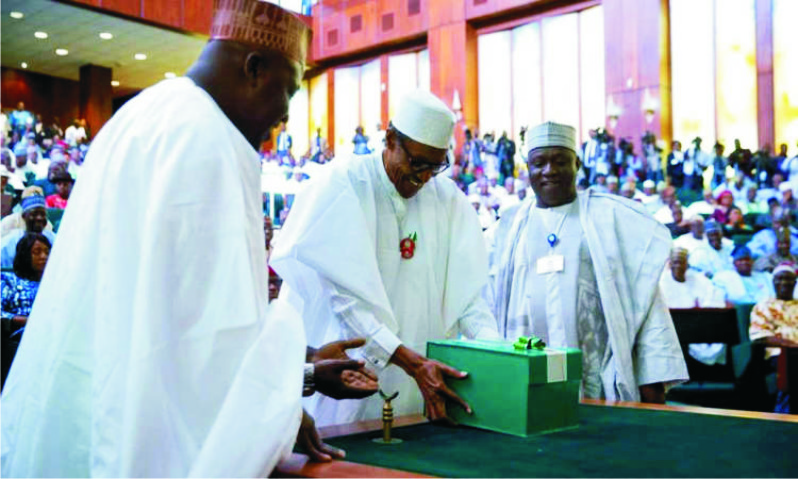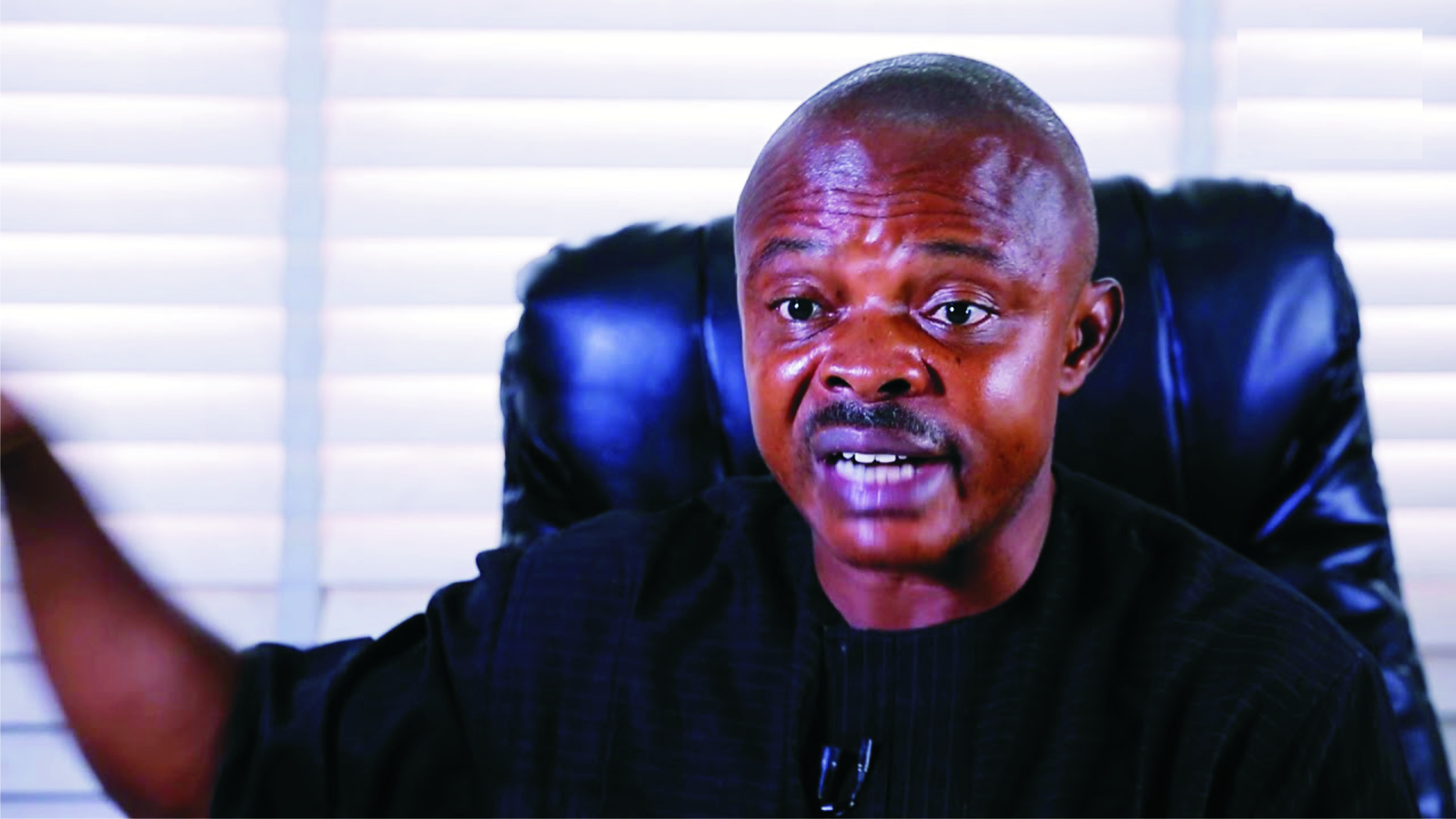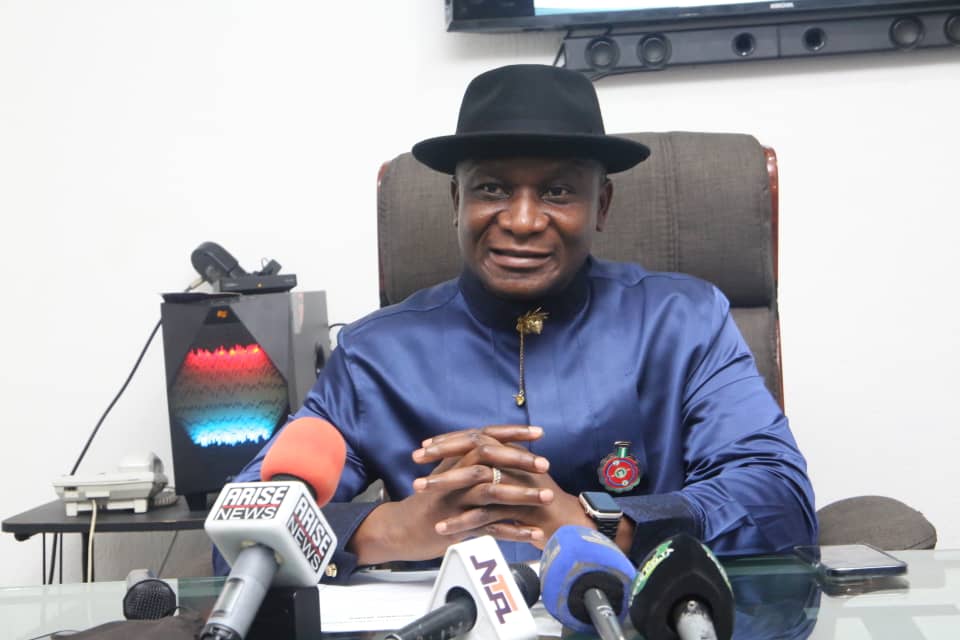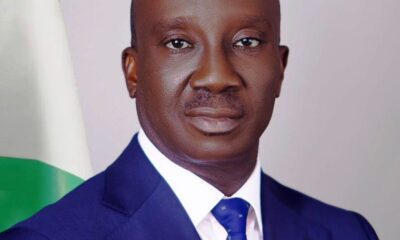News
Buhari Presents 2020 Budget To NASS, Tuesday

President Muhammadu Buhari will next Tuesday present the 2020 budget to the joint session of the National Assembly.
This was disclosed by the Senate President, Dr. Ahmad Lawan, yesterday.
Lawan made the disclosure in a letter from Buhari, which he read to the lawmakers on the presentation of the 2020 Appropriation Bill on Tuesday, 8th October, 2019 to the Joint Session of the National Assembly.
The reading of the letter comes after the Senate, yesterday, passed the 2020-2022 Medium Term Expenditure Framework and Fiscal Strategy Paper (MTEF/FSP) submitted to it by President Muhammadu Buhari, last week.
This followed the presentation and consideration of the report of the Senator Solomon Adeola-led Senate Committee on Finance by the Red Chamber in Abuja.
The upper chamber in the approved MTEF/FSP for 2020-2022 increased the Federal Government’s proposed expenditure for 2020 from N10.002trillion to N10,729.4trillion.
The Senate also increased the oil benchmark from $55 per barrel to $57 per barrel, representing a $2 increase.
The Senate also increased the 2020 revenue target by the Nigeria Customs Service (NCS) by N557.4billion, that is, from N942.6billion to N1.5trillion.
It, however, retained the exchange rate at N305 per dollar and oil production benchmark at 2.18mbpd as proposed in the MTEF/FSP by the executive.
The committee also recommended the adoption of N1.5trillion as the amount for new borrowing by the Federal Government in 2020, as a result of reduction of N200billion which was sourced from the increase of revenue target of the Nigeria Customs Service.
The committee further called for an urgent review and amendment to the Fiscal Responsibility Act (FRA Act) and the various laws of the revenue generating agencies to align with current realities.
This information form part of the recommendations of the National Assembly Joint Committee on Finance report on 2020-2022 MTEF/FSP which was considered by the Senate in Abuja, yesterday.
The committee’s recommendations which were approved by the Senate are as follows: “Following intensive engagement with NNPC and relevant information obtained during the session, the committee recommends the adoption of 2.18mbpd as daily production output in 2020. In view of concerted effort by NNPC and security agencies the menaces of oil theft and vandalization, the 2.18mbpd would be realizable.
“The committee recommends the adoption of $57/barrel as crude oil benchmark price for the fiscal year 2020.
“The revenue target of Nigeria Customs Service (NCS) of N942.6billion for 2020 should be increased to N1.5trillion, as a result of the performance of NSC in last nine months with three months still outstanding.
“The NCS revenue as at September stood at N1trillion against the budget figure of N969.8billion for the year 2019. The Joint Committee commends the NCS for exceeding the targeted revenue despite the global economic challenges and closure of the Nigerian borders.
“The sum of N557.4billion from the revenue increment of NCS be used to reduce borrowing by N200billion and increase capital expenditure thereby decreasing the size of the budget deficit from N1.7trillion to N1.5trillion and also increase the total capital available to MDA by N357billion, from N1.01trillion to N1.367trillion.
“The exchange rate of N305/$ should be maintained for economic stability. While more work should be done by the Honourable Minister of Finance and all economic advisers and her team on improving the economic growth by increasing the GDP and reducing the inflation rate to single digit.
“The saving on income accruing from the increase of the benchmark amounting to N172billion which represent the Federal Government portion of the $2 added to the benchmark be used to pay salaries and emolument of the proposed 30,000 new employees.
“Proper investigation be carried out on the e-collection stamp duties domicile with Central Bank of Nigeria (CBN) for the past years so as to show probity and accountability and of course increase the revenue base of the country.
“Immediate amendment of the National Assembly Act on Production sharing Contracts (PSC) with lOCs. Proper investigation be carried out on NNPC so as to ascertain the actual cost associated with the Joint Venture agreements.
“More government-owned enterprises budget be added to the nation’s budget to ensure proper checks and balances among all Federal Government agencies.
“Debt Management Office (DMO) should put more efforts and strategies in managing foreign and local debts.
“Total estimated expenditure of the Federal Government should be increased from N10.002trillion to N10.729.4trillion.
“National Assembly should expedite action on the passage of the finance bill which will be brought along with the National Budget into Law for easy implementation of the 2020 budget, most especially in the area of VAT.
“The committee calls for an urgent review/amendment to the FRA Act and the various laws of the revenue-generating agencies to align with current realities.
“The committee recommends earmarking 1 per cent of the Consolidated Revenue Fund to finance the Basic Healthcare Provision Fund to be classified as Statutory Transfer.
“The committee recommends the adoption of N1.5trillion as the amount for new borrowing as a result of reduction of N200billion which was sourced from the increase of revenue target of the Nigeria Customs Service.
“However, borrowing must be project-tied. ln borrowing, government must remain focused and ensure that it used the money to fund critical projects that will increase productivity and contribute to finance financing such debt.”
The committee in its findings observed that crude oil receipt accounted for over 50 per cent of Federal Government revenue and about 90 per cent of Nigeria’s foreign exchange earnings.
“Therefore, crude oil production and export will continue to have important implication on federal fiscal operation.
“Over the last three years crude production average 1.92mbpd, however, following consultations with stakeholders, crude oil production is estimated at 2.18mbpd, 2.2mbpd and 2.3mbpd in 2020, 2021 and 2022,” the committee said.
The committee also noted that oil prices had generally been rising since April, 2016 as Bonny Light crude oil price rose from an average of $43 per barrel in 2016 to $56.2 in 2017 and $72.1 in 2018 partly due to geopolitical tensions.
It said that 2019, Bonny Light crude oil price increased steadily from January average of $60/barrel (to) a six-year high well above $70/barrel between April and May, 2019.
“It is noteworthy, that volatility of crude all markets and fluctuating price requires constant review and forecast.
“The non-oil revenue for 2020, 2021 and 2022 is budgeted to be as follows: N1,836,693,720.000; N2,205,807,930,754 and N2,337,091,481,680, respectively,” the committee said.
The committee further said it observed during the public hearing on the 2020-2022 MTEF & FSP, that the salaries and remunerations for the proposed recruitment of 30,000 personnel in Police, Army, Immigration and civil defence was not captured.
It also said that the total VAT proposed in the 2020-2022 MTEF/FSP amounting to N23trillion can be realized only after the amendment of the finance bill is passed into law by the National Assembly.
The committee, however, frowned at the attitude of Central Bank of Nigeria (CBN) for the under disclosure of the e-collection of stamp duties.
The committee further observed that the activities of NNPC as it relates to cost of production is shrouded in secrecy, “the direct deduction of cost from revenue without recourse to relevant agencies of government is unacceptable.”
It also noted that 10 government-owned enterprises (GOEs) budget would be presented along with the 2020 National Budget
“These GOEs include FAAN, NCAA, NlMASA, NPA, NAMA, Shippers Council, NDIC, NCC e.t.c.,” the committee said.
The findings read in part: “The committee observed that the exchange rate of N305/$ is maintained over the past three years. Also noted that the GDP growth rate is currently standing at 2.93 per cent and an inflation rate at 10.81 per cent.
“That most of the revenue-generating agencies have failed to comply with relevant extant law of the Fiscal Responsibility Act which stipulates payment of 80 per cent of operational surpluses to the Consolidated Revenue Fund.
“The committee observed that the Federal Government is stepping up investment in health and education to fill the skills gap in the economy, and meet the international target set under the UN’s Sustainable Development Goals (SDGs).
“The Federal Government is earmarking 1 per cent of the Consolidated Revenue Funds to finance the Basic Healthcare Provision Fund to be classified as Statutory Transfer. Federal Government believes that investing in people is a core objective of ERGP.
“Government is taking steps to enhance human capital development particularly in health, education and social intervention programs in other to reduce poverty.
“Based on the joint IMF-World bank debt sustainability framework which has a Debt/GDP threshold of 56 per cent for countries in Nigeria’s Peer Group, Nigeria’s debt is expected to remain sustainable within the MTEF period.
“This implies that Nigeria Debt/GDP ratio of 19.39 per cent can afford it to expand its borrowing limits. As at 31st December, 2018, Nigeria public debt stock is valued at N24.387trillion ($79.436billion), rising at an average of 12.24 per cent per annum.
“With regard to 2020 fiscal year, the estimated budget deficit is N1.70trillion and it will largely be financed through borrowing as it has been the tradition while also additional financing of N252.08billion will be derived from privatization proceeds and N328.13billion from loans secured for specific developmental projects.
“The committee further observed that Nigeria’s current debt profile is not alarming as expressed in some but within the threshold of 3 per cent as contained in the Fiscal Responsibility Act.”
Each of the recommendations was unanimously adopted by the Senate when they were put to voice vote by the President of the Senate, Dr Ahmad Lawan.
Similarly, the House of Representatives has approved the 2020 to 2022 Medium Term Expenditure Framework (MTEF) submitted to it by President Muhammadu Buhari.
In the approval, the House jerked up the 2020 budget size from N10.002trillion contained in the MTEF to N10.729trillion.
It also adopted $57 as a benchmark as the price for a barrel of oil in the international market, placing N305 per dollar as official exchange rate while adopting production of 2.18 million barrels of crude per day.
The House gave the approval at the Committee of Supply when it considered the MTEF, yesterday.
Part of the resolutions read thus: “That the total expenditure of the Federal Government should be an increase from N10.002trillion to N10.729.4trillion.
“That the exchange of N305/$ should be maintained for economic stability while more work should be done by the minister of finance and her team and all economic advisers on improving economic growth by increasing the GDP and reducing the inflation rate to a single digit.”
News
May Day: Labour Seeks Inclusiveness In Policy-making

The Organised Labour yesterday, called on the Federal Government to ensure inclusiveness in policy making and guide against erosion of rights, such as free speech and association.
The President, Nigeria Labour Congress (NLC), Mr Joe Ajaero made the call at the 2025 Workers’ Day celebration held at the Eagle’s Square, Abuja.
The Tide source reports Ajaero and the President, Trade Union Congress, Mr Festus Osifo delivered a joint statement on behalf of the organised labour at the event.
Ajaero described May Day as, not only a moment to honour workers’ sacrifices, but also a platform to demand justice and accountability from those in public office.
He frowned at the alleged suppression of protests, and the erosion of rights of workers by some agents
According to him, workers have a duty to resist economic injustice, insecurity, and policies that undermine their dignity.
Speaking on the theme of the day, the NLC President underscored the need for Nigerian workers to reclaim the civic space and resist policies that contribute to worsening economic conditions.
“Our theme this year – “Reclaiming the Civic Space in the midst of Economic Hardship – reflects the urgent need for citizens to protect democracy and push back against repression.
“The civic space, where Nigerians express their concerns and challenge injustices is shrinking.
“If we fail to reclaim this space, the foundation of our democracy risks collapse,” he said
Ajaero, therefore, urged workers to unite and resist division, fear, and despair.
He also urged them to mobilise and organise for change, declaring that the right to demand better conditions is non-negotiable.
“Without workers, there is no society; without labour, there is no development. We must take our place in the fight for economic justice and democratic governance.”
Speaking in the same veins, Osifo said workers are the backbone of the nation—the educators, healthcare providers, builders, farmers, and innovators who sustain its economy -.
He stressed the need for the labour to reclaim the civic space even in the midst of economic hardship.
News
2025 UTME: JAMB Disowns Site Requesting Payment From Candidates

The Joint Admissions and Matriculation Board (JAMB) has disassociated itself from a fraudulent site requesting payments from candidates who missed the ongoing 2025 Unified Tertiary Matriculation Examination (UTME).
The board said that the site, “Copyrightwriter Personal J Rescheduling Flw” and account number 8520641017 at Sterling Bank, associated with it, are scam.
The disclaimer is contained in a statement made available to newsmen in Abuja on Thursday by the Board’s Public Communication Advisor, Dr Fabian Benjamin.
Benjamin said the account is being exploited to defraud unsuspecting candidates who missed their UTME.
“We issue this urgent notice to inform the public about this nefarious scheme targeting candidates who were unable to participate in the UTME.
“Some unscrupulous individuals are deceitfully soliciting payments of N15,700 under the false pretence of offering rescheduling services for the examination.
“Let us be unequivocal: this, it is a blatant scam, and we are confident that the public will not fall prey to such cheap and regressive tactics.
” The individuals behind this scam have no affiliation with JAMB or any legitimate government agency.
“The account details provided in these communications are entirely fictitious and bear no connection to any official processes; they exist solely for the purpose of perpetrating fraud,” he said.
Benjamin called on Sterling bank to take immediate and decisive action against this criminal activity.
According to him, JAMB has reported the matter to the relevant security agencies and actively pursuing those responsible for this deceitful act.
He further said that “JAMB does not reschedule examinations for candidates who miss their scheduled tests due to reasons unrelated to the Board’s actions”.
He, however, said that the Board is conducting a thorough investigation for candidates whose biometrics failed during verification and were thus unable to sit for the examination.
He said those without discrepancies would be invited to retake the examination at no cost , stressing that “no cost is required”
“It is imperative to understand that JAMB does not charge any fees for examinations after a candidate has completed their registration.
“We strongly urge all candidates to remain vigilant and not to succumb to these fraudulent schemes.
“Protect yourselves and report any suspicious activity immediately,” he explained.
News
NDDC Seeks UN’s Support To Accelerate Niger Delta Development

The Niger Delta Development Commission (NDDC) has expressed its willingness to partner with the United Nations (UN) to accelerate the development of the Niger Delta region.
Dr Samual Ogbuku, Managing Director of the NDDC, made the appeal in a statement issued by the commission’s Director of Corporate Affairs, Mrs Seledi Thompson-Wakama, in Port Harcourt on yesterday.
According to the statement, Ogbuku sought the UN’s support during his visit to the UN Resident and Humanitarian Coordinator (UNRHC), Mr Mohammed Fall, at the UN regional office in Abuja.
He called on the global body to provide the NDDC with technical assistance and expert services to support the region’s development.
“We are eager to collaborate with the UN, recognising that the state governments in the region and the NDDC alone cannot achieve the level of regional development required,” he said.
Ogbuku identified key areas where support would be needed, including the provision of portable and affordable drinking water powered by high-tech solar energy sources.
He also highlighted the importance of reforesting the mangrove swamps, which have been severely damaged by decades of environmental degradation caused by oil exploration in the Niger Delta.
“Although the NDDC has made progress in providing solar-powered streetlights across the region, we still require UN support in delivering solar energy solutions for residential buildings.
“We also wish to explore the possibility of installing solar mini-grids in homes across communities, which would boost local commerce and trade,” he added.
The NDDC managing director further appealed for increased UN involvement in areas such as healthcare, education, youth training, gender development, and food security.
Ogunku stated that such interventions would significantly enhance the standard of living in the region.
In response, Fall affirmed the UN’s readiness to collaborate with the NDDC to fast track development in the Niger Delta.
He assured that the UN would support initiatives in food security, job creation, education, and renewable energy, among other areas.
“We aim to approach development in the Niger Delta holistically, rather than focusing solely on environmental pollution.
“This is merely an entry point; however, the UN’s development vision aligns with the Sustainable Development Goals (SDGs), which are designed to positively impact various aspects of people’s lives,” Fall stated.
He assured the NDDC of continued and fruitful engagements to drive the region’s development.
-
Business4 days ago
FG Introduces Zinc Rice Varieties For Food Safety
-

 News4 days ago
News4 days agoOkpebholo Approves New Minimum Wage Of N75,000 For Edo Workers
-
Politics4 days ago
NASS To Prioritise Workers’ Welfare, Akpabio Assures Labour On May Day
-

 Niger Delta4 days ago
Niger Delta4 days agoRivers Begins, Supplemental Polio Vaccination, Morrow
-
Niger Delta4 days ago
Federal Workers Shun Protest In C’River
-
Nation4 days ago
‘New Aeronautics Varsity ’ll Transform Nigeria Into Aircraft Manufacturing Hub’
-
Business4 days ago
Farmers Set Expectations For New BOA MD
-
News4 days ago
Tinubu Urges Youths To Leverage NASRDA Skills Acquisition Project For Employment

